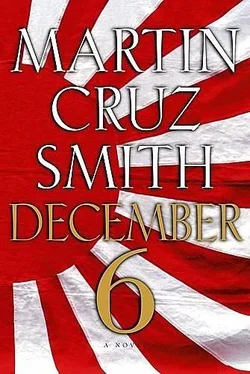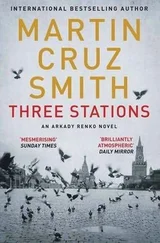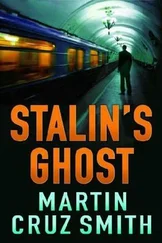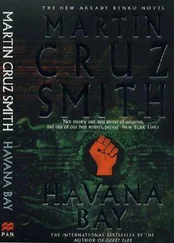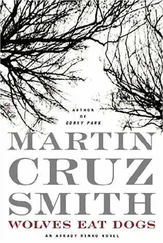
Martin Cruz Smith
December 6
IT IS ALWAYS AMAZING how generously people offer their time, encouragement and expertise to a writer they have never met before. For the writer, they are the bridge that mysteriously appears as he crosses an abyss.
In America, I am indebted to Mary Culnane and Joe Morganti, Serge Petroff and Hiro Sato, Irwin Scheiner and Cecil Uyehara. Kathryn Sprague, Nell and Nelson Branco and Luisa Cruz Smith read various versions of the book. Ann Lamott shared the letters written home by her grandfather, a missionary in prewar Japan. Knox Berger shared the notes he made on a fire raid over Tokyo. David Rosenthal rolled the dice with Harry.
In Japan, I was aided and informed by Toshio Kanamura, Misao Maeda, Peter O’Connor, Armin Rump and Allen West, Andrew and Mariko Obermeier. Takashi Utagawa chased facts, maps and charcoal-powered taxis. David Satterwhite and Clifford Clarke described the unique experience of growing up as a Southern Baptist in Japan.
Finally, Jish Martin read manuscript, translated material and corrected mistakes almost as fast as I produced them.
And Ted Van Doorn took it on himself to literally lead me through another world.
For Em
Letter from Tokyo
JAPAN APPEARS CALM AT BRINK OF WAR
British Protest “Defeatist Speech” by American
By Al DeGeorge
Special to The Christian Science Monitor
TOKYO, DEC. 5-While last-minute negotiations to avert war between the United States and Japan approached their deadline in Washington, the average citizen of Tokyo basked in unusually pleasant December weather. This month is traditionally given to New Year’s preparations and 1941 is no exception. Residents are sprucing up their houses, restuffing quilts and setting out new tatamis, the grass mats that cover the floor of every Japanese home. When Tokyoites meet, they discuss not matters of state but how, despite food rationing, to secure the oranges and lobsters that no New Year’s celebration would be complete without. Even decorative pine boughs are in short supply, since the American embargo on oil has put most civilian trucks on blocks. One way or another, residents find ingenious solutions to problems caused by the embargo’s sweeping ban on everything from steel and rubber to aviation fuel. In the case of oil, most taxis now run on charcoal burned by a stove in the trunk. Cars may not have the old oomph, but passengers in Tokyo have learned to be patient.
In a country where the emperor is worshiped, there is no doubt about Japan ’s position in the negotiations, that Japan has fairly won China and deserves to have the embargo lifted. The American position, that Japan must withdraw its troops first, is considered hypocritical or misguided. Secretary of State Cordell Hull and Secretary of War Henry Stimson are regarded here as unfriendly, but the Japanese people have great faith in President Franklin Roosevelt as a more sympathetic ear. A Ginza noodle vendor gave his appraisal of the high-level stalemate: “It is the same with all negotiations. At the last moment, resolution!”
In fact, one of the most anticipated events is the release of the censor’s list of new films from Hollywood. There is no embargo on American movies. They fill the theaters, and stars like Bette Davis and Cary Grant grace the covers of fan magazines here. The older generation may sit still for Kabuki, but the younger set is wild for the silver screen.
The only frayed nerves visible showed in a speech delivered today at the Chrysanthemum Club, the meeting place for Tokyo ’s banking and industrial elite. American businessman Harry Niles declared that Japan had just as much right to interfere in China as America did to “send the marines into Mexico or Cuba.” Niles described the American embargo as an effort to “starve the hardworking people of Japan.” He also attacked Great Britain for “sucking the life’s blood of half the world and calling it a Christian duty.”
British Embassy First Secretary Sir Arnold Beechum said that Niles ’s words were “out-and-out defeatist. The French and the Danes fell through the treasonous activities of collaborationists just like Niles. We are seriously considering a protest to the American embassy over the activities of their national.” The American embassy refused to comment, although one official suggested that Niles had stood outside embassy control for a long time. The official, who preferred anonymity, said the club’s choice of Niles as its speaker was telling. “It’s a strong suggestion of Japanese impatience with the talks in Washington, an ominous indication, I’m afraid.”
Otherwise, the city went about its business in its usual brisk fashion, squirreling away treats for the New Year, perhaps lighting an extra stick of incense to pray with, but apparently confident that no final rupture will break Japan ’s amiable relationship with the United States.
FIVE SAMURAI crept forward with a scuffle of sandals, eyes lit like opals by a late setting sun. A bloody haze flooded the alley, tinting street banners red, soaking drab wooden shops and houses in a crimson wash.
The story was tragic, true, profoundly satisfying. Lord Asano had been taunted by the unscrupulous Lord Kira into drawing a sword in the shogun’s presence, an act punishable by death. He was beheaded, his estate confiscated and his retainers dispersed as ronin, wandering samurai with neither home nor allegiance. Although the evil Kira went unpunished, he watched the samurai, especially their captain, Oishi, for the slightest sign that they plotted revenge. And when, after two years, Kira’s vigilance finally relaxed, on a snowy December night, Oishi gathered the forty-six other ronin he trusted most, scaled the walls of Kira’s palace, hacked the guards to pieces, hauled Kira himself from his hiding place and cut off his head, which they carried to the grave of their dead Lord Asano.
Gen, the strongest and fastest boy, played Oishi, his leadership marked by the aviator’s goggles he set high on his head. Hajime, second in command, had a face round as a pie pan and wore a baseball catcher’s quilted vest as his suit of armor. Tetsu wrapped muslin around his waist, the style of a criminal in training. The Kaga twins, Taro and Jiro, were rotund boys in raveled sweaters. Both were ready to eat nails for Gen if he asked. Each of the five boys swung a bamboo rod for a sword, and each was deadly serious.
Gen motioned Hajime to look around the ragpicker’s cart, Tetsu to search among the sacks stacked outside the rice shop, the twins to block any escape from a side alley of brothels and inns. Prostitutes watched from their latticed windows. It was summer, the peak of a warm afternoon, with neither clouds nor customers in sight, shabbiness plain, the city’s poor clapboard houses huddled like a hundred thousand boats battered and driven by storm from the bay to founder along rivers, canals and filthy sluices, here and there a glint of gilded shrines, at all levels laundry rigged on poles, and everywhere the scurrying of children like rats on a deck.
“Kira!” Gen called out. “Lord Kira, we know you’re here!”
A whore with a face painted white as plaster hissed at Tetsu and nodded through her bars to a pile of empty sake tubs at the alley’s end. Gen approached with wide-apart legs, his bamboo sword held high over his head with both hands. As he brought it down, the tubs thumped like drums. His second stroke was a thrust. The tubs rolled away and Harry squirmed out, his ear pouring blood.
Читать дальше
